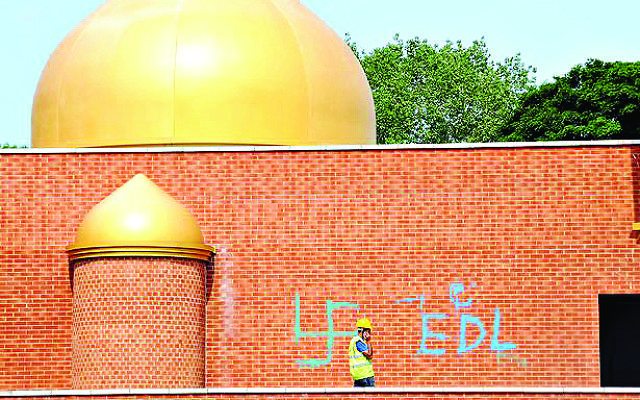New government report urges better hate crime reporting
First assessment by HMICFRS says authorities should use reporting to predict problems as it warned of no national overview
A Government body that assesses the effectiveness of the police has urged officers to use hate crime reporting better in order to see future problems, in its first report on the subject.
In its investigation, Her Majesty’s Inspectorate of Constabulary and Fire & Rescue Services (HMICFRS) also said that a lack of central Government recording meant there was no national overview of the problem.
The Inspectorate raised the alarm after looking at responses to hate crime victims, and published its findings this week in a report called ‘Understanding the Difference.’
While the public are now be able and willing to report hate crime, central Government has devolved the monitoring of it, and while it still requires police to flag hate incidents, in 2016 the Home Office stopped asking forces for the information they collect.
The report said this could be problematic as “because forces don’t have to report the numbers and type of hate incidents to the government, there is no possibility of using this data to inform the national hate crime picture”.
HMICFRS said it was told that the reasons for this were “a desire to reduce the burden on forces” and “because of the variations in the way forces record incidents, there were concerns about the consistency of the data supplied”.
Police are required to record the religion of the victim where religion is a motivating factor, and the Inspectorate said that forces’ incident recording should provide “valuable information about hostility towards different communities,” adding that it is “often the first indications of the likelihood of future incidents and crimes”.
However, the report’s authors note that although this information acts as a “warning signal,” forces were not using the data to form a preventative approach. “In the forces we visited, only three had a problem profile for hate crime which used the analysis of hate incidents to inform the force approach.”
They added that recording was still not systematic, saying: “Some of these incidents will be crimes that have gone unrecognised and unrecorded by the police.”
HOPE not hate deputy director Jemma Levene said: “This report comes at a time when the reporting of hate crimes of all kinds is rising dramatically. What is most worrying is that the report is based on data from 2012-2014, and all our research shows that there has been a massive surge in reported hate crime since then.”
The report also flagged an inconsistent approach to the way hate crime victims are treated, and said that opportunities to involve communities were being lost.
“Only two of the forces inspected have considered the importance of involving members of the community in routinely examining cases that hadn’t been sent to the CPS,” it said. “This was surprising, considering this is a valuable way of learning about the experiences of victims.”
Levene said it was now more important than ever to get it right. “At a time when Britain is becoming more divided than ever before, it is crucial that officers are well trained in issues around race, religion, sexuality, disability and gender,” she said.
“Recent polling suggests that is frequently not the case. More consistent training and professional support for officers is urgently needed, both to allow them to recognise hate crimes for what they are, and to support victims when they come forward.”

Thank you for helping to make Jewish News the leading source of news and opinion for the UK Jewish community. Today we're asking for your invaluable help to continue putting our community first in everything we do.
For as little as £5 a month you can help sustain the vital work we do in celebrating and standing up for Jewish life in Britain.
Jewish News holds our community together and keeps us connected. Like a synagogue, it’s where people turn to feel part of something bigger. It also proudly shows the rest of Britain the vibrancy and rich culture of modern Jewish life.
You can make a quick and easy one-off or monthly contribution of £5, £10, £20 or any other sum you’re comfortable with.
100% of your donation will help us continue celebrating our community, in all its dynamic diversity...
Engaging
Being a community platform means so much more than producing a newspaper and website. One of our proudest roles is media partnering with our invaluable charities to amplify the outstanding work they do to help us all.
Celebrating
There’s no shortage of oys in the world but Jewish News takes every opportunity to celebrate the joys too, through projects like Night of Heroes, 40 Under 40 and other compelling countdowns that make the community kvell with pride.
Pioneering
In the first collaboration between media outlets from different faiths, Jewish News worked with British Muslim TV and Church Times to produce a list of young activists leading the way on interfaith understanding.
Campaigning
Royal Mail issued a stamp honouring Holocaust hero Sir Nicholas Winton after a Jewish News campaign attracted more than 100,000 backers. Jewish Newsalso produces special editions of the paper highlighting pressing issues including mental health and Holocaust remembrance.
Easy access
In an age when news is readily accessible, Jewish News provides high-quality content free online and offline, removing any financial barriers to connecting people.
Voice of our community to wider society
The Jewish News team regularly appears on TV, radio and on the pages of the national press to comment on stories about the Jewish community. Easy access to the paper on the streets of London also means Jewish News provides an invaluable window into the community for the country at large.
We hope you agree all this is worth preserving.






















